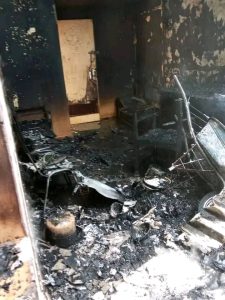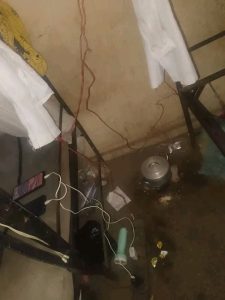By Shamsudeen Abubakar

On a warm morning of March 11, 2025, a tragic fire outbreak unfolded in Block A of Jubril Aminu hostel, one of student’s halls of residence under the management of Usmanu Danfodiyo University, Sokoto, (UDUS). The incident results in the loss of valuable possessions, including clothes, books and mattresses, among others. It also pushed some students into suffering, while leaving others in a dilemma as they lost almost everything in the flames.
Eyewitness accounts revealed that the fire started in the morning as a result of illegal connection of wires in one room. When the fire broke out, only a student was in the room while others were out for their daily activities.
Manir Abba (not a real name) was lying on his bed as he romanced his phone. The visitation of this reporter woke him from the expectation of an alert of a thousand naira from his friend. He stood to his buttocks, sitting comfortably as if he was expecting this reporter.
When asked about the reason that led to the fire incident in his hostel, he told the News Digest Press that the source of the outbreak could be traced to the illegal connection of wires in the school hostel while others were away.
“Illegal connection leads to the fire outbreak in this room,” Ibrahim said, pointing to the black signs of fire burnt in the room. “The wire is small and it can not withstand the hotplates we are using to cook,” he continued, stressing that the occurrence damaged some of their belongings — including his clothes. He added that some valuables such as mattresses were burnt in the process, as he recounted how fellow students’ intervention helped in overcoming the blazing fire.
The issue of fire outbreak is not peculiar to UDUS alone. The menace battling the school communities reflected a major problem battling Nigeria. A report by the Safety Initiative Group showed that about 48% of fire incidences in Nigeria are caused by human mistakes and negligence. As cities grew and populations swelled, the risk of fire outbreak became alarming. The report further revealed that these occurrences are often fueled by inadequate infrastructure and poor safety measures. The consequences were so devastating, with properties lost, dreams destroyed, and students left to pick up their pieces, the report concluded.
In 2024, a research stated that Nigerian tertiary institutions have experienced numerous fire outbreaks. For example, Obafemi Awolowo University (OAU) recorded three fire incidents in 2018 alone, worsened by lack of functional fire extinguishers in hostels.
Other notable incidents include the fire outbreak at University College, Ibadan. The incident destroyed multi-billion-naira buildings and equipment. Similarly, a fire incident at Ahmadu Bello University (ABU) gutted a male hostel, destroying mattresses, clothes, and valuables. Plateau State Polytechnic also suffered a female hostel fire outbreak that caused campus-wide confusion.
According to PM News, the major causes of fire outbreaks include electrical sparks and faulty electrical equipment, which accounted for hundreds of incidents Nationwide in 2021. Other causes of the fire outbreak include illegal storage of petroleum products, gas leaks, cigarette stubs, bush burning, arson, and accidents. Electrical-related fire incidents remain the leading cause of fire outbreaks in Nigeria.
Millions Lost In A Flame
UDUS has witnessed numerous fire incidents over the years, with devastating losses in hostels such as Jubril Aminu, DV female hostel, and school mini-market, among others. These fire incidents have resulted in the destruction of valuable items, including certificates, foodstuffs, and credentials. The majority of these incidents unfolded on a scorching Friday.
Fatima Abubakar, an eyewitness to the fire outbreak at DV female hostel in 2022, recounted her experience during an interview with The News Digest Press. She explained that an illegal wire connection sparked the flame that happened in the hostel. Phones, laptops, clothes, foodstuffs were among other valuables destroyed by the fire outbreak.
Bello Hibatullah Ojumirola, another resident of DV hostel, narrated the devastating consequences students were left with after the fire incident ravaged the hostel. Although she was not around when the incident occurred, she surveyed the aftermath. She told the News Digest Press that about six rooms were left in shambles.
“About six rooms were totally damaged, upstairs and downstairs. The area is now being avoided by everyone.”
The harsh climate of Sokoto has been linked to factors that usually compounded frequent fire outbreaks in the school. It is not uncommon to see students seeking refuge under the canopy of trees in a bid to escape the sweltering sun that torments the human body with blazing fumes.
“There were speculations stating the usage of gas cookers, illegal wire connections, and the use of hotplates as the reasons account for most of the fire outbreak in UDUS,” said Muheeb Mashood, a 400-level student of Law.
Muheeb believed that the fire outbreaks in the school used to last for about 1-2 hours. Students’ timely intervention plays a vital role in quenching all the fire incidents that had happened in the UDUS campus. He emphasized that students worked in an organised manner to quench the fire.

Fire Disaster: A Recurrence Incident in UDUS
Over the last five years, UDUS has witnessed devastating fire outbreaks that have resulted in significant loss of properties. Some of these incidents occurred in the school owned hostels, private hostels, and the school mini-market. This has left deep scars on students, businessmen, and staff. These fire outbreaks are majorly caused by illegal wire connections, electrical faults, hotplates, gas cookers, and a lack of emergency preparedness.
In 2021, a fire outbreak razed nearly six shops in the Jubril Aminu Hostel Mini-market. Waste burning was reported to be the cause of the fire outbreak. It destroyed valuable items belonging to students, including laptops, rugs, and clothing materials, among other things. The report added that the Federal Fire Service, Sokoto, responded promptly, but their efforts were hindered by interference from onlookers.
Also, in 2022, a significant fire outbreak caused by an insecure electrical connection affected four rooms in DV female hostel. It destroyed foodstuffs, clothes, gadgets, and credentials among others.
In March 2025, a similar incident occurred in Block A of Jubril Aminu Hostel. An illegal wire connection is said to have sparked the devastating fire outbreak. Students narrowly escaped, but lost valuable possessions, including clothes, books, mattresses, and many more.
Also, in June 2025, a fire broke out in the Porter office at Jubril Aminu Hostel. The incident was reported to have destroyed official documents, a refrigerator, chairs, and electrical components, among others. The cause of the fire remains under investigation, with some speculations linked to faulty electrical wiring or confiscated gas cylinders.
Nigeria’s Alarming Fire Statistics
The menace of fire incidents have left a severe impact on the social, economic, and humanitarian effect on the Nigeria people, especially vulnerable populations.
According to ReliefWeb, the Coordination of Humanitarian Affairs (OCHA) under the United Nation, the issue of fire incidents is among the biggest challenges facing Nigeria, with a deathblow on the country’s already crippling economy.
In March, 2024, the report revealed that the Northeast Nigeria IDP camps in Borno State witnessed 80 fire outbreaks, affecting 8,814 households and 44,095 individuals, resulting in 27 casualties and destroying 8,857 shelters. These fire outbreaks worsen vulnerabilities, increasing health and protection risks for women and children, and lead to loss of essential belongings.
Also, a 2023 Review of Fire Outbreak in Nigeria by Engineering Safety and Security Solutions noted that fire disasters had led to tragic loss of lives and destruction of public and private assets worth trillions of naira in the country. The Federal Fire Service estimates losses of public assets worth about N3 trillion across Nigeria. Moreover, fire outbreaks stifle economic development and deepen poverty by destroying businesses and infrastructure, as evident in Kano State’s 660 fire incidents and 123 deaths in 2017.
Data indicates that harsh weather conditions, particularly extreme heat and dryness, have contributed to frequent fire outbreaks in Sokoto State, Nigeria. The region experiences very high temperatures, with records reaching up to 44.8% Celsius, linked to climate change and prolonged dry seasons. This extreme heat and dryness create flammable conditions that facilitate the ignition and spread of fire outbreaks.
Also, a 2021 Survey stated that extreme weather and dryness fueled the fire outbreak in Sokoto Central Market. This finding underscores the broader trend in Sokoto, where numerous fire incidents, including major market and residential blazes, have been linked to the dry, hot weather. The Sokoto Central Market has been particularly prone to fire disasters over the years, with many cases attributed to human carelessness and exacerbated by the dry conditions.
Students Disregard School Regulations, Cause Unreturned Effects
The management of Danfodiyo university prohibited the usage of contrabands, illegal electrical connections among the students living in the school-owned hostels. This is specifically provided for in section 6 subsection 4, item number 2 of the Students’ Handbook, a guideline regulating students’ activities as relates to the varsity. This development was made in a bid to control the recurrence of fire outbreaks in the school.
The provision reads: “Gas cookers, Air conditioners, refrigerators, hot plates/rings and other electrical appliances must not be used in hostel rooms without approval of the Dean of Student Affairs. Contravention of this regulation shall attract seizure and eventual forfeiture of the prohibited items. Cooking stoves and other acceptable cooking devices as approved by the University must not be used in rooms, toilets or stores.”
Despite the management stern warning, the cracks that led to the provision of the Students’ Handbook still ripples, as residents of these hostels never ceased engaging in these illegal activities while disobeying the school regulations.
However, students also cited economic hardships, neglect from the school management to address power disconnections as some of the reasons that pushed them to unending violations.
According to Abdullahi (second name withheld due to fear of animosity), a final-year student of English and Literary Studies, he stated that students resort to the usages of the prohibited items due to the lack of stable power connections.
He further stressed that students can go to any extent to make sure they have lights, whether they connect their wires well or not.
Abdullahi testified that desperation led to haphazard wire connections, with wires snaking from room to room, increasing the risk of the fire outbreaks. “Students prioritized getting power over their safety.”
The socio-economic situation in the country has also contributed to the widespread use of these prohibited items. With the rising cost of gas, some students have turned to hotplates as a cheaper alternative. Others use them because they are fast and allow students to cook fast for quick lectures.
“Many students believe the benefits outweigh the risks,” Uthman Abba (name withheld due to fear of intimidation), another resident of Jubril Aminu noted.
Uthman added that lack of effective monitoring and enforcement of the school regulations has also created a culture of impunity, where students feel they can get away with the usage of prohibited items.
‘Protecting Students From Themselves’—Dean Student Affairs
Professor Umar Aliyu, the Dean of Student Affairs, sheds light on the school management’s efforts to ban the use of prohibited items like contraband and others in hostels.
He revealed that they regularly seized contraband items including hotplates, and gas cookers which posed a significant fire hazard risk to the students.
But despite repeated warnings, many students continue to use these items, promoting the Dean’s office to work closely with Hall Governors to identify and confiscate contrabands.
“We are helping the students to safeguard their own life and properties,” Professor Aliyu calmly stated, highlighting the administration’s commitment to student safety.
This Story was completed with the support from The News Digest Press, UDUS
